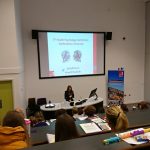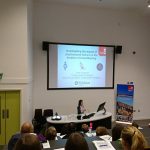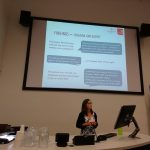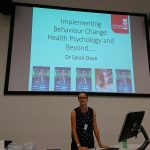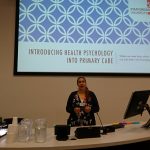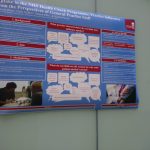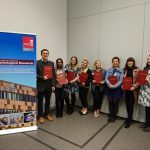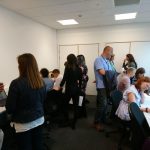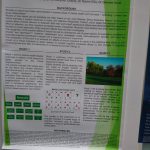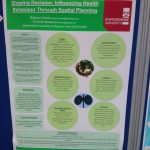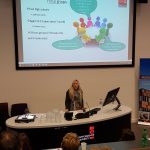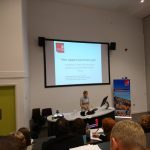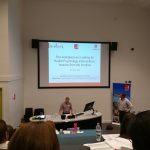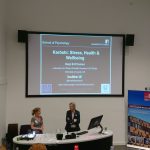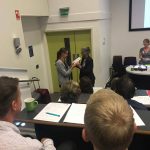By Dr Robert Dempsey, Senior Lecturer in Psychology.
Together, working with one of our MSc in Health Psychology students and a fellow member of staff (Dr Amy Burton), we have just published a paper using a photo-elicitation approach to understand the lived experience of quality of life amongst a group of individuals experiencing paraplegia and chronic pain.
Our paper, currently in press in the Journal of Health Psychology, details a novel study where we were interested in better understanding the factors which give and take away from the quality of life experienced by people living with paraplegia (who experience paralysis to their lower limbs due to a spinal cord injury) and chronic ongoing pain. Many people who are paraplegic also experience chronic pain but studies to date have tended to focus on self-report measures of pain experiences. Using self-report measures of pain experiences might not allow researchers to really understand the nature and quality of pain, as the experience of pain can be difficult to objectively measure, and may not help understand how individuals ‘make sense’ of these experiences.
It is well known that managing chronic pain when living with paraplegia, and being reliant on a wheelchair for mobility, can be a challenging experience for many people.  We were particularly interested in understanding how people in this situation manage their pain and maintain a good quality of life, whilst maintaining a focus on their experiences as individuals. A lot of qualitative research into people’s experiences of physical health conditions uses researcher-led interview schedules focused on topics that the researchers are interested in – this can be problematic as it may not allow the participants to direct the interview discussions towards topics and issues they feel are important when making sense of their own experiences.
We were particularly interested in understanding how people in this situation manage their pain and maintain a good quality of life, whilst maintaining a focus on their experiences as individuals. A lot of qualitative research into people’s experiences of physical health conditions uses researcher-led interview schedules focused on topics that the researchers are interested in – this can be problematic as it may not allow the participants to direct the interview discussions towards topics and issues they feel are important when making sense of their own experiences.
To help us ensure our study was focused on our participants’ experiences we used a form of interview technique referred to as photoelicitation, sometimes known as photovoice. Rather than just asking our sample of participants a series of questions about their experiences, we asked them to spend a week taking photos of things they felt took away from their quality of life or improved their quality of life. Six photographs from each participant were then chosen for discussion in the interviews, during which we only asked the participants some general questions about their photograph (such as: ‘what does this photograph represent in terms of your quality of life?‘). Our discussions based on these photographs produced some incredibly rich and complex data, showing some of the complexities of living with paraplegia, chronic pain and also using a wheelchair for mobility (which we wouldn’t have found if we just asked a series of set questions).
For example, one of our participants discussed a photo she took of a toy dinosaur, similar the one shown on the right. The participant explained that this toy dinosaur represented her experiences with healthcare staff, particularly doctors, who she saw as being old-fashioned, not understanding of her pain experiences and frustrating to deal with. These communication problems contributed to this participant’s worsening pain as she was often prescribed ineffective medications attributed to her pain experiences not being understood by healthcare staff. Discussions like this demonstrated the complexity of our participants’ experiences living with pain and paraplegia whilst attempting to maintain a good quality of life – often related to a sense of frustration that factors like medical professionals should help improve, not worsen, their quality of life.
photo she took of a toy dinosaur, similar the one shown on the right. The participant explained that this toy dinosaur represented her experiences with healthcare staff, particularly doctors, who she saw as being old-fashioned, not understanding of her pain experiences and frustrating to deal with. These communication problems contributed to this participant’s worsening pain as she was often prescribed ineffective medications attributed to her pain experiences not being understood by healthcare staff. Discussions like this demonstrated the complexity of our participants’ experiences living with pain and paraplegia whilst attempting to maintain a good quality of life – often related to a sense of frustration that factors like medical professionals should help improve, not worsen, their quality of life.
Interestingly, using a wheelchair was viewed as a factor that both improved and worsened our participants’ quality of life. Some participants were grateful for the wheelchair giving them independence, to be mobile and not be over-reliant on others to get around. However, this sometimes came at the cost of the wheelchair preventing our participants from being fully mobile (e.g. by not being able to access parts of their own home or having difficulty using public transport) and even caused further pain and discomfort due to sitting in the chair.
Using photo-elicitation, and allowing our participants to be much more involved in directing the interview discussions, produced some rich data participant-focused data which demonstrated the complexity of living with both paraplegia and chronic pain. Had we just used a standard set of written questions we would not have uncovered such complexity in our participants’ experiences. The use of photographs to guide the interviews could be incorporated into healthcare communication practices as it may help healthcare professionals to better understand their patients’ experiences, particularly of chronic pain which can be difficult to communicate verbally.
It was a pleasure to work with one of our MSc in Health Psychology students (Melanie Hughes), who led the data collection, and one of our Health Psychologist colleagues (Dr Amy Burton) on this analysis. This project represents one of a number of published studies and papers produced with students as part of our BPS Accredited Stage 1 MSc in Health Psychology course here at Staffordshire University.
We have published two papers based on this research, including a commentary paper reflecting on the use of photo-elicitation as an interview tool and our recent paper detailing our analysis of the interviews (click here). Links to the papers can be found below:
- Hughes, M., Burton, A. E., & Dempsey, R. C. (in press). “I am free in my wheelchair but pain does have a say in it though”: The meaning and experience of quality of life when living with paraplegia and chronic pain. Journal of Health Psychology.
- Burton, A. E., Hughes, M., & Dempsey, R. C. (2017). Quality of life research: A case for combining photo-elicitation with interpretative phenomenological analysis. Qualitative Research in Psychology, 14(4), 375-393.
Staffordshire University – The Home of Health Psychology
Staffordshire University’s Centre for Health Psychology is a  centre of excellence for teaching and research in Health Psychology, and is home to Staffordshire’s BPS Accredited Stage 1 MSc in Health Psychology and Stage 2 Professional Doctorate in Health Psychology. The Centre for Health Psychology is part of the Staffordshire Centre for Psychological Research.
centre of excellence for teaching and research in Health Psychology, and is home to Staffordshire’s BPS Accredited Stage 1 MSc in Health Psychology and Stage 2 Professional Doctorate in Health Psychology. The Centre for Health Psychology is part of the Staffordshire Centre for Psychological Research.
Keep updated with the latest Health Psychology news from Staffordshire University via following us on @StaffsPsych and via the #HealthPsychStaffs hashtag.
For further information about Health Psychology courses and research at Staffordshire University please visit the following webpages:
 centre of excellence for teaching and research in Health Psychology, and is home to Staffordshire’s BPS Accredited Stage 1 MSc in Health Psychology and Stage 2 Professional Doctorate in Health Psychology. The Centre for Health Psychology is part of the Staffordshire Centre for Psychological Research.
centre of excellence for teaching and research in Health Psychology, and is home to Staffordshire’s BPS Accredited Stage 1 MSc in Health Psychology and Stage 2 Professional Doctorate in Health Psychology. The Centre for Health Psychology is part of the Staffordshire Centre for Psychological Research.














